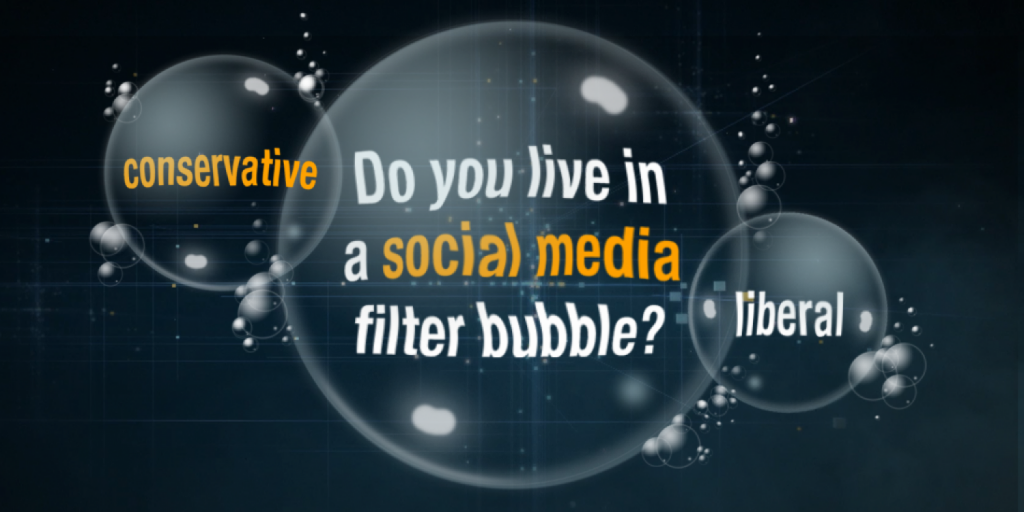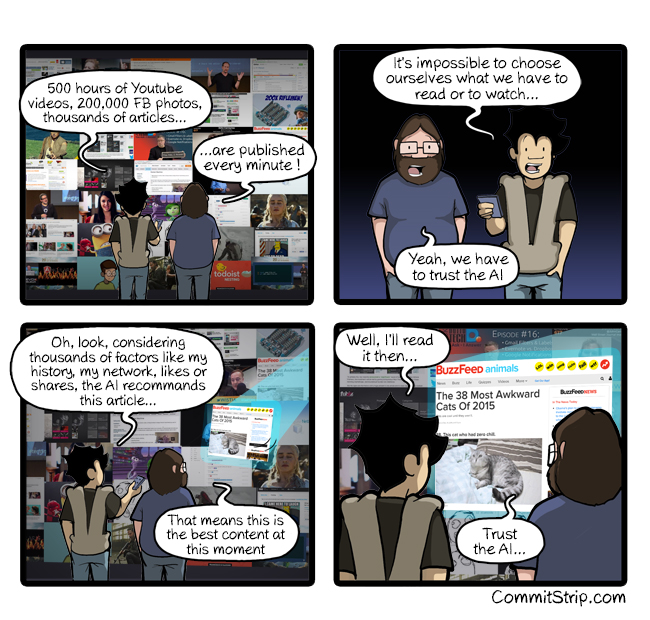Wait! What? Extremism and social media in the same sentence seems a bit strange right? Indeed, social media tends to refer to freedom of speech and openness; Extremism on the opposite refer to racism or closed mind, …
Well yes, I see a correlation between the rise of social media and the rise of extremism and I will tell you why! Let me explain you.
The problem of suggestion algorithms
In the old times, when you used to read the newspaper to get informed, or even when you used to watch TV you were bombarded with a lot of information. Some of which was interesting to you, some not. But at least you were aware of what happened in the world in a kind of generic way. Even if you were more interested in the results of the last football championship than in the presidential elections, you could not avoid reading the cover page of the newspaper with the face of your new president. You had still the freedom to chose which TV channel or which newspaper to buy in function of your affinities, but in general you tended to be a little bit informed in an objective way.
Today, you don’t watch TV anymore, neither you read the newspaper! Right? Well yes, you read online newspapers and you watch online news through your Facebook/Twitter/Instagram page with the articles that your friends are sharing on their walls. Why isn’t this the same? This is a great innovation and now you are yourself also an actor in the spreading of news because you can share to your friends what REALLY matters! Isn’t it?
But let’s have a close look at how does social media activity feeds work. They try to model your behaviour, your preferences and your profile based on several criteria:
- Themes you look at
- Brands you like
- Friends you follow
- Articles you click on
- Videos you watch
Maybe you already noticed that the ads that you see are usually suited for your profile. This is not a secret anymore: the feed adapts to you to make sure you enjoy your time looking at it. And this is automated by an algorithm. Otherwise how would social networks make money!
Why is there a problem here? Well it’s simple. Let’s take an example: You are a fan of football, you feel close to left-wing parties and you like tech innovation. What will your feed look like?
- You’ll see articles about the champions league, the scandals that players are involved with, the results of the latest matchs in your region and advertising about the latest shoes of Nike.
- You’ll also see that the left wing party has a great campaign to help homeless people, that the parlement denies left-wings ideas and outrageous scandals happened on the right wings.
- You’ll watch videos about the latest Samsung and Huawei found that were released last week and you’ll think that once again this is too bad that prices are so high.

In other words, you’ll only see what you’re interested in. You’ll not be aware about the political crisis in Brasil nor the financial impact of the right-wing party on handicapped people, …

When you only see what you care about, you tend to think that everyone things like you. So if you are left-wing, eventually, you’ll have the impression that you are at the center because everything you see if left-winged. You may even think you have right-winged opinions in comparison to what you see. So you’ll be tempted to go further left … and further left …
But you are not comparing yourself with the public opinion, you are comparing yourself with an algorithm !!!
My point is that algorithms tend to push people towards extremes because they will only see things that are in their personal scope. When you have to forge your opinion and you don’t have access to the wide range of point of views, you’ll more and more become “narrow minded”
How about search engines?
We see somehow the same happening with the search engine bubble. In another way.
When someone search about a particular topic, you may already have noticed that results differ based on the person and the computer that you are using. For example, if you search for the word “python” and you are a biologist, the results will speak about this very dangerous snake that can kill you in a single bite. But if you are an IT, the results will be about the program language called python and the different available libraries that you can use as a coder.
On top of that, the order of the results usually depends on the relevance of the sources. A lot of websites are trying to prove their relevance by optimising their content and get higher in the results. This is called SEO. How does it work? The more you optimise, the more other websites refer to you, the better the keywords you use, the higher you get in the search results.
SEO is a real business. But wait? If I just need to pay and tweak my website to get higher in the results, does it mean that veracity and reliability of the content is not checked? No ! Algorithms can not trace veracity because they only compare what they see on the web. But how to be sure you’re being informed by the true information?
Exactly! This is the problem. You need to cross information yourself. Google will not do it for you.
As we can see in the video below. The search engine bubble is a big problem. We are polarising the internet and this is dangerous !
Fake news, what is that now about?
Classical news businesses are having a hard time with their businesses. Indeed, less and less people are buying paper news so they need to reinvent their business model. But it’s hard to attract users on their websites, so in order to attract them they need to have very catchy titles and images. You probably already noticed some articles where the image that you see has nothing to do with the content but just serves to get you on the page.
Less and less people are professionnal journalist: no one pay for them : no business model for journalism. Everyone become his own copywriter, but no technical knowledge, no neutrality => less qualitative information!!
The main revenue model of journalism was based on advertising. It was probably not perfect, but still one of the less bad system. Today advertising has become a very tough business.
At the same time, people say : it’s impossible to be uninformed today => well indeed we have so much information around us… but is this information really qualitative? Is it even true? How do you verify information? Maybe yes if you’re reading some high quality medias such as BBC, Financial Times, Economist, … but their business model is still not completely stable
Conclusion
I still believe that algorithms are a great way to reduce noise in all the volume of information that you get bombarded with, but it’s important to stay aware that everything we see is not always representative of what people think in general, and sometimes we might face fake news and we have to be critical towards the sources that are refered. Always cross-check sources before making big assumptions and continue meeting people that are different that you: nothing is better than crossing the street and getting other’s people opinion direct from the source !!
